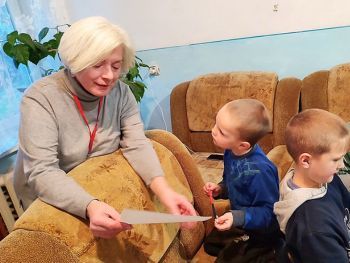"I didn't look back, I just hugged my children": a story of escape from the occupation
Maria's courageous escape from the occupation
Maria (name changed) endured bombing, occupation, and flight from her hometown of Kherson, Ukraine. When the Russian occupation army captured Kherson, she fled to a village with her children and great-grandmother. The constant threat of enemy shelling sent her into panic attacks, leaving her physically and emotionally exhausted. Amid the chaos, Maria's resilience prevailed. She defied the occupation, relying on information from people who had fled to plan an escape. Eight Russian checkpoints stood between Maria and freedom, each filled with uncertainty and fear. Yet her unwavering determination carried her forward, holding her children close as they fled. Within days, she and her family were able to find refuge in Lviv, where Maria reached out to psychological counselors from our partner Malteser Ukraine for support.
Tereza, guiding the journey to recovery

Tereza Gevko, a psychologist working with Malteser Ukraine, showed how important the role of psychologists is in supporting people like Maria on their way to recovery. Displaced people in Ukraine face many challenges during the war, requiring a wide range of psychological services. Psychologists need to be equipped to provide psychiatric consultations, child psychology support, family counseling, and long-term psychotherapy to address the complex emotional situation of those affected.
How is displacement affecting mental health ?
Displacement impacts mental health, leading to increased stress, anxiety, and other challenges. According to figures from Internal Displacement Monitoring Centre (IDMC), it is estimated that around 30 per cent of populations displaced by conflict suffer from depression, anxiety or post-traumatic stress disorder (PTSD). By addressing these needs, psychologists play a vital role in guiding individuals like Maria towards healing, resilience, and the hope of rebuilding their lives amidst the circumstances.








